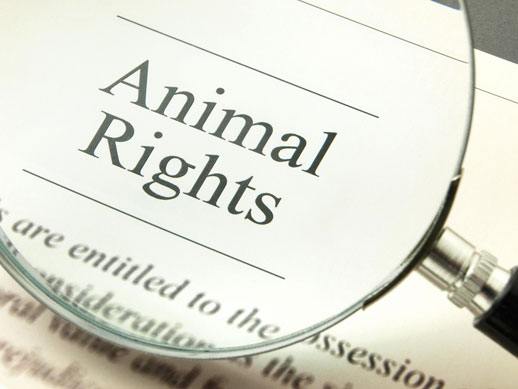
Disregarding the advice of many counselors, Paquette interned with animal groups while she attended Vermont Law School. "[Many people said] I should have interned at large firms, so I could at least be guaranteed a job," Paquette explained. But her work at nonprofits helped her realize that she did not want to work for a big corporation or law firm. Instead, she wanted to work for a nonprofit that was helping animals.
| "Be persistent because there aren't a lot of jobs out there. At some point, when you know you really want to work in the animal field, it may seem like it's never going to happen, but if you keep pushing and you keep pursuing various organizations, the likelihood of it happening is greater than one would think," Paquette said. |
Her hard work for nonprofit animal groups ultimately paid off. Just one year after graduation, equipped with the proper experience and connections, Paquette accepted the position of Government Affairs Coordinator at the Animal Protection Institute, a national nonprofit organization that works to protect animal rights.
Paquette joined the institute in 1999 and was promoted to General Counsel two years later. In 2002, her role was changed to General Counsel and Director of Legal and Government Affairs.
The Animal Protection Institute, headquartered in Sacramento, CA, primarily works on issues relating to wildlife, exotic animals, research animals, and farm animals. It is considered the leading organization for exotic animal protection. "We work on trying to prohibit the private possession of exotic animals as pets," Paquette said.
Paquette manages API's legal department and develops strategies to handle all major disputes and personnel issues. She reviews all of the institute's contracts and materials that will be sent to members and the public.
The institute also works to enact new state and federal animal laws. However, the institute focuses primarily on local and state initiatives. For instance, last year the institute helped Kentucky and Arkansas pass laws prohibiting the possession of exotic animals as pets. Also, with the help of API, several states are currently in the process of passing new bills that would protect animals' rights, Paquette said.
The institute is committed to protecting wildlife, as well, Paquette said. Last year, API challenged a California bill that would have exempted nuisance animal control (pest control) units, who trap and kill wild animals, from fundamental competency requirements. The institute was instrumental in modifying the bill, which now provides basic protections for five animal species that are frequently trapped or poisoned because they are "nuisance" animals.
The public plays an important role in API's legislative efforts. "We depend heavily on our constituents, residents, and the general public to help us," Paquette said.
"For example, in order to get a bill passed, you need people in that state writing their own legislators. We send out our alerts far and wide and post them on various listservs in the hopes that people are going to write their legislators and urge them to support a progressive piece of animal legislation," Paquette said.
Therefore, public outreach is an essential component of API's campaigns. Representatives from the institute frequently speak at events to inform the public about animal law. "We're heavily dependent on people showing up for those events, working with their communities to make positive change," Paquette said.
In an effort to keep the public informed, the institute publishes a quarterly magazine and sends weekly newsletters. The Action Alerts and Announcements newsletter is geared toward activists who want to help change legislation, while the API Bulletin newsletter targets animal rights supporters who want to keep abreast of API's actions.
Paquette graduated from Vermont Law School in 1998. In 1994, she earned a Bachelor of Arts in Political Science, with honors, from San Francisco State University. She is a member of the District of Columbia, Massachusetts, and California bars.


